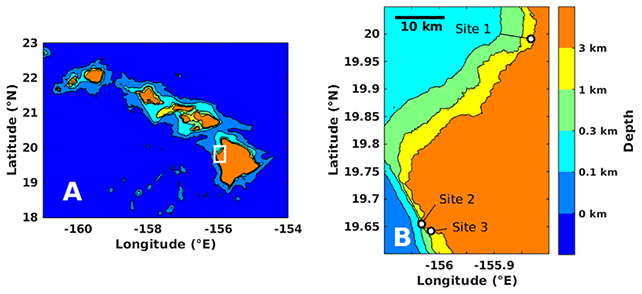Coral reefs, often referred to as the “rainforests of the sea,” are vibrant ecosystems teeming with life and activity. Beyond their stunning visual beauty, these underwater wonderlands are also home to a cacophony of sounds that provide valuable insights into the health and dynamics of reef ecosystems. In a groundbreaking study published in PLOS ONE, researchers have unveiled a fascinating discovery: the sounds emanating from coral reefs undergo distinct changes as the moon rises and sets. This phenomenon sheds new light on the intricate relationship between lunar cycles and the behavior of marine organisms, offering a unique perspective on the hidden rhythms of reef life.
The Role of Reef Sounds in Assessing Health: Sound plays a crucial role in the underwater world, serving as a vital communication tool for marine organisms and providing valuable clues about ecosystem dynamics. Previous research has demonstrated that the health of coral reefs can be assessed by monitoring the soundscape—the collective sounds produced by fish, invertebrates, and other reef inhabitants. A bustling reef, alive with activity, typically generates a symphony of sounds, while a quieter reef may indicate a decline in biodiversity and ecological health. By listening to these underwater sounds, scientists can glean valuable insights into the vitality of coral reef ecosystems.
Exploring the Influence of Lunar Cycles: Building on this foundation, researchers from the U.S. Navy’s Naval Undersea Warfare Center and the Advanced Research Projects Agency–Energy embarked on a pioneering study to investigate how lunar cycles affect coral reef soundscapes. Recognizing the moon’s influence on tides, light levels, and marine behavior, the research team hypothesized that changes in lunar phases could impact the activity levels of reef organisms and, consequently, the sounds they produce. To test this hypothesis, the researchers deployed underwater microphones off the coast of Hawaii and monitored reef sounds over the course of a year, capturing minute-by-minute fluctuations in noise levels.
Unveiling the Lunar Symphony: The results of the study revealed a fascinating correlation between lunar phases and coral reef soundscapes. As the moon rose, casting its ethereal glow upon the sea, the researchers observed an increase in high-frequency pulses of sound, accompanied by a decrease in low-frequency noise. Conversely, as the moon set and darkness enveloped the reef, the reverse pattern emerged, with low-frequency pulses dominating the soundscape. These findings suggest that lunar illumination directly influences the activity levels of marine organisms, shaping the acoustic environment of coral reefs in a rhythmic dance with the moon.
Interpreting the Findings: The observed changes in coral reef sounds offer valuable insights into the behavior and ecology of reef inhabitants. The increase in high-frequency pulses during moonrise may indicate heightened foraging activity among nocturnal fish species, drawn to the illuminated waters. In contrast, the prevalence of low-frequency noise during moonset could reflect the retreat of diurnal organisms seeking shelter in the cover of darkness. By decoding these acoustic signals, researchers gain a deeper understanding of how lunar cycles regulate the behavior and spatial distribution of reef communities.
Implications for Conservation and Monitoring: The discovery of lunar influences on coral reef soundscapes has significant implications for reef conservation and monitoring efforts. By incorporating lunar data into acoustic monitoring programs, scientists can refine their understanding of reef dynamics and better assess ecosystem health. Additionally, the ability to detect subtle changes in reef sounds over lunar cycles provides a valuable tool for identifying environmental stressors, such as pollution or overfishing, that may disrupt natural rhythms and threaten reef resilience. By leveraging this newfound knowledge, conservationists can implement targeted strategies to protect and preserve these vital marine ecosystems.
The study of coral reef soundscapes offers a fascinating glimpse into the hidden world beneath the waves. Through meticulous observation and analysis, researchers have unveiled the intricate relationship between lunar cycles and reef acoustics, revealing a captivating symphony shaped by the rhythms of the moon. As our understanding of these underwater ecosystems continues to evolve, so too does our appreciation for the delicate balance of life that sustains coral reefs. By listening closely to the sounds of the reef and decoding their messages, we unlock new avenues for conservation, research, and stewardship, ensuring that these vibrant ecosystems thrive for generations to come.
